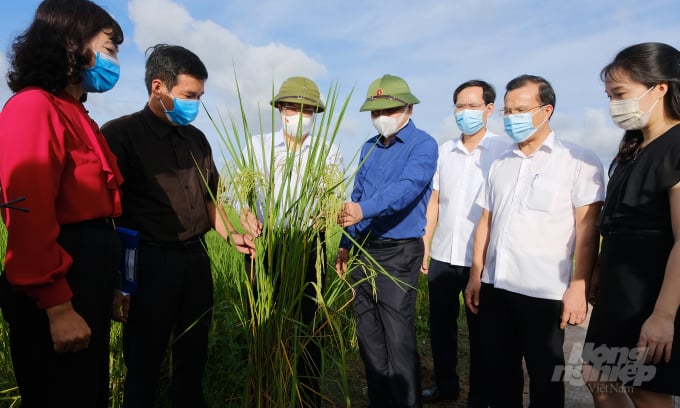June 2, 2025 | 18:39 GMT +7
June 2, 2025 | 18:39 GMT +7
Hotline: 0913.378.918
June 2, 2025 | 18:39 GMT +7
Hotline: 0913.378.918

Deputy Minister Nguyen Hoang Hiep (middle) using models of silicon nano-fertilizers in Ninh Binh. Photo: Bao Thang.
On September 22nd, the Ministry of Agriculture and Rural Development delegation, led by Deputy Minister Nguyen Hoang Hiep, visited two models of silicon nano-fertilizers use in Yen Khanh district, Ninh Binh. Observing cantaloupes grown in greenhouses and rice fields laden with cotton, disease-free, the delegation was delighted and appreciated the effectiveness of the new fertilizers generation.
Silicon nano-fertilizer based on nano application is produced by Nanofarm Company, and exclusively distributed by Dang Quang Nanofarm Company. As a fertilizer with a balanced ratio of nutrients, these fertilizer strains have been tested in a number of localities. First step brought many positive feedback.
In Ninh Binh, silicon nano-fertilizers have been used since 2020, on crops such as rice, leafy vegetables, peanuts, cucumbers, etc. As a result, the yield increased by about 30% or more. Especially on rice, the plants become hard and strong, limiting pests, diseases and reducing about 50% of the pesticides used.
Specifically, the total cost on fields using silicon nano decreased by about 4.8 million VND/ha. In which, the amount of pesticides decreased by 50%, and the amount of fertilizer decreased by 30-40%. Additionally, rice yield increased by an average of 40% compared to conventional fertilizers.
On cucumber plants, the cost is reduced by 12.5 million VND/ha. Watermelon by more than 5 million VND/ha. With vegetables, the cost savings is about 9.2 million/ha. With peanuts, farmers can cut 5.7 million VND/ha. Sweet potato by 5 million VND/ha.
With the fertilizer prices continuously increasing since the beginning of 2021, the use of fertilizers is economical and appropriate, and at the same time, researching new products similar to silicon nano-fertilizer that help ensure productivity, quality and efficiency is a potential direction.
Ms. Hoang Hai Anh, Director of Dang Quang Nanofarm Company, said that nanoscale fertilizers (under 100nm) help plants absorb easily. Currently, there are many types of silicon-containing fertilizers on the market, with different concentrations and names. Depending on the ratio of silicon and the mixing substances, fertilizers will have different effects on plants.
"The development of a new generation fertilizer product by Nanofarm Dang Quang Joint Stock Company, using silicon nanotechnology is one of the effective measures towards responsible and sustainable agriculture", Mr. Hoang Trung Director of the Department of Plant Protection commenting on new generation fertilizers.
Concluding the meeting on the afternoon of September 22nd, Deputy Minister of Agriculture and Rural Development Nguyen Hoang Hiep suggested Ninh Binh province to continue to research and replicate new technologies, avoiding dependence on traditional inorganic fertilizers. Because this is a thorough policy by the Ministry of Agriculture and Rural Development, as well as a solution to help farmers reduce input costs, increasing investment efficiency in industrial production.
"Using nanotechnology fertilizers helps to reduce costs and increase crop yields. This is the best approach to convince farmers," Deputy Minister Nguyen Hoang Hiep said.
Translated by Nguyen Hai Long

(VAN) Novel process harnesses machine learning to reveal groups of genes that determine how efficiently plants use nitrogen.

(VAN) Several scientists and farmers are experimenting with soil treatment in some key durian-growing regions such as Cai Lay (Tien Giang), Dak Song, Gia Nghia, and Dak R’lap (Dak Nong).
/2025/05/25/4127-3-073637_820.jpg)
(VAN) Thanks to the promotion from an FAO-implemented project, vegetable production in greenhouses in Moc Chau has seen strong development, from 1.5 hectares in 2021 to nearly 50 hectares in 2024.

(VAN) FAO has recently supported USD 140,000 to implement the project 'Risk mitigation human-animal interface risks through disease control initiatives in pig farming.'

(VAN) The People's Committee of Tra Vinh province has approved an adjustment to the investment policy for the Green Hydrogen Plant project, increasing its area to approximately 52.76 hectares.
![Reducing emissions from rice fields: [2] Farmers’ commitment to the soil](https://t.ex-cdn.com/nongnghiepmoitruong.vn/608w/files/news/2025/05/05/dsc08881jpg-nongnghiep-140632.jpg)
(VAN) Clean rice cultivation model in Thuong Tan commune, Bac Tan Uyen district, is assisting local residents in achieving sustainable agriculture by substantially reducing costs, increasing productivity, and protecting the environment.

(VAN) At the conference to disseminate Resolution No. 68, AgriS introduced its digital agricultural ecosystem and reaffirmed its commitment to accompanying the Government in promoting private sector development and sustainable agriculture.